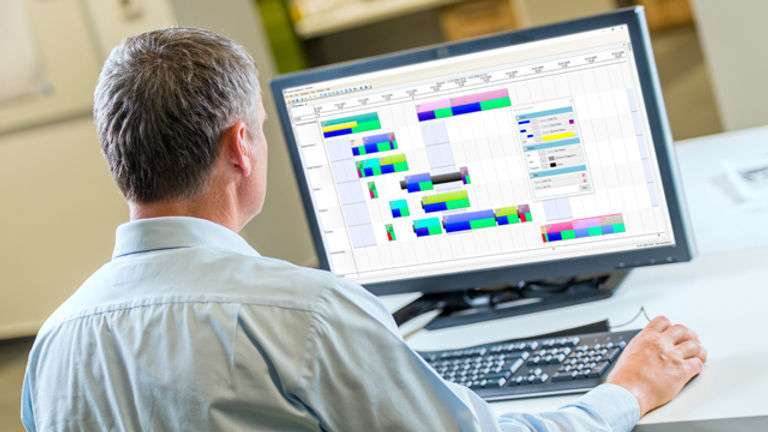Advanced Scheduling
Siemens Opcenter Advanced Scheduling is an interactive, multi-constraint scheduling system that provides support for decision-making for overtime, order prioritisation, production batches, due date negotiation, and order processing.
The Siemens Opcenter Advanced Scheduling software is an interactive, multi-constraint scheduling system. Availability of resources and additional constraints, such as tooling and materials, are all taken into consideration during scheduling to ensure an accurate model of your environment. Orders can be scheduled quickly using intelligent built-in rules, and the planner also has the ability to manually interact with the schedule to make changes based on their experience or new information.
Advanced Scheduling provides decision-making support for overtime, order prioritisation, split production batches, due date negotiation, and order processing.

Features
Advanced Scheduling provides visibility and control to support better scheduling decisions.
Read more about these features below.
Advanced Constraint Modelling (Professional)
Model advanced resource constraints, such as rules about concurrent rule usage, and advanced inter-operation constraints including limits on the time between operations and how much operation times can be extended.
Advanced Schedule Optimisation (Professional)
Define additional schedule optimisation rules to deal with problems such as minimising changeover times, preferred sequencing, and campaigning. Composite rules can be built with the SIMATIC IT Preactor workflow tool.
Assembly Process Visualisation (Professional)
Visualise the assembly process from raw materials through to finished goods and sales orders in the Material Explorer. This shows a graphical view of the material dependencies as well as plots of stock levels over time. See where shortages will occur and choose to keep them as a constraint, or ignore them.
Order Based Multi-Constraint Scheduling (Standard)
Create order based schedules and apply a ranking or weighting in order to prioritise orders. The software creates schedules based on resource availability, additional constraints, and materials required for the order. Create schedules taking into account different operation run speeds on different resources, use sequence dependent changeover times based on operation attributes, and allow overlaps and slack time between operations.
Advanced Material Handling
Implement custom rules about how materials are consumed to ensure that sub-assemblies and raw materials are consumed according to business rules. When allocating materials, the system filters and ranks data to allow quality-related or customer-specific material usage constraints to be accounted for.
Development Environment (Ultimate)
Gives access to the full flexibility possible. Database schema and constraint model can be altered as required, including adding tables and fields. Create custom scheduling rules to solve specific scheduling problems and custom data manipulation tools for use with the workflow engine.
Interactive Schedule Viewing (Ultimate Viewer)
Allows interaction with the schedule, but changes cannot be saved. Viewers can be used in the sales office to track the progress of orders and carry out order inquiries against a read-only copy of the published schedule. Management can use them to compare actual times with scheduled completion times to assess performance of the production process. Viewers can be used on a shop floor PC to provide the cell supervisor or machine operator with up-to-the-minute work-to-lists generated by the scheduling system.
Model advanced resource constraints, such as rules about concurrent rule usage, and advanced inter-operation constraints including limits on the time between operations and how much operation times can be extended.
Define additional schedule optimisation rules to deal with problems such as minimising changeover times, preferred sequencing, and campaigning. Composite rules can be built with the SIMATIC IT Preactor workflow tool.
Visualise the assembly process from raw materials through to finished goods and sales orders in the Material Explorer. This shows a graphical view of the material dependencies as well as plots of stock levels over time. See where shortages will occur and choose to keep them as a constraint, or ignore them.
Create order based schedules and apply a ranking or weighting in order to prioritise orders. The software creates schedules based on resource availability, additional constraints, and materials required for the order. Create schedules taking into account different operation run speeds on different resources, use sequence dependent changeover times based on operation attributes, and allow overlaps and slack time between operations.
Implement custom rules about how materials are consumed to ensure that sub-assemblies and raw materials are consumed according to business rules. When allocating materials, the system filters and ranks data to allow quality-related or customer-specific material usage constraints to be accounted for.
Gives access to the full flexibility possible. Database schema and constraint model can be altered as required, including adding tables and fields. Create custom scheduling rules to solve specific scheduling problems and custom data manipulation tools for use with the workflow engine.
Allows interaction with the schedule, but changes cannot be saved. Viewers can be used in the sales office to track the progress of orders and carry out order inquiries against a read-only copy of the published schedule. Management can use them to compare actual times with scheduled completion times to assess performance of the production process. Viewers can be used on a shop floor PC to provide the cell supervisor or machine operator with up-to-the-minute work-to-lists generated by the scheduling system.

